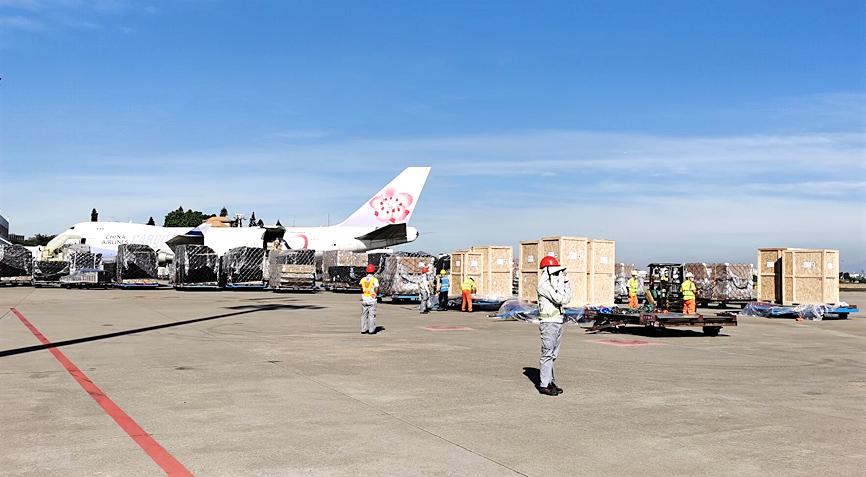Freight forwarder T3EX Global Holdings Corp (台驊國際) on Friday reported revenue for last year of NT$3.45 billion (US$124.6 million), up 90 percent from a year earlier, and cumulative revenue of NT$36 billion for the year, up 137 percent from a year earlier, on the back of high shipping rates.
Revenue from its sea cargo forwarding operation showed the highest growth among all sections, advancing 224 percent from a year earlier to NT$25.6 billion for last year, followed by 137 percent growth from its railway forwarding business to NT$1.69 billion, T3EX said.
Port congestion and labor shortages, as well as COVID-19 lockdowns in Southeast Asian countries, continued to push sea freight rates upward, contributing to revenue momentum, the forwarder said.

Photo courtesy of Dimerco Express Corp
“Shippers’ on-time ratios remain at a record low level — only one-third of all vessels can operate and deliver goods on time. There is still a discrepancy between supply and demand in the sea shipping market,” T3EX said in a statement.
The forwarder expects air cargo rates to remain high this year, as the disruption in the sea freight market could prompt more clients to utilize air services, it said.
T3EX’s peer Dimerco Express Corp (中菲行) on Thursday reported revenue of NT$38.85 billion for last year, up 72 percent from a year earlier, on stronger freight rates.
Dimerco, which focuses on strategic logistics planning and execution for international goods, saw full-year revenue from its air cargo forwarding operation rise 47.5 percent from a year earlier to NT$21.22 billion, accounting for 54.7 percent of all revenue, it said.
Revenue from its sea freight forwarding operation advanced 137 percent year-on-year to NT$16.2 billion, accounting for 41.8 percent of all revenue, it said.

In Italy’s storied gold-making hubs, jewelers are reworking their designs to trim gold content as they race to blunt the effect of record prices and appeal to shoppers watching their budgets. Gold prices hit a record high on Thursday, surging near US$5,600 an ounce, more than double a year ago as geopolitical concerns and jitters over trade pushed investors toward the safe-haven asset. The rally is putting undue pressure on small artisans as they face mounting demands from customers, including international brands, to produce cheaper items, from signature pieces to wedding rings, according to interviews with four independent jewelers in Italy’s main

Macronix International Co (旺宏), the world’s biggest NOR flash memory supplier, yesterday said it would spend NT$22 billion (US$699.1 million) on capacity expansion this year to increase its production of mid-to-low-density memory chips as the world’s major memorychip suppliers are phasing out the market. The company said its planned capital expenditures are about 11 times higher than the NT$1.8 billion it spent on new facilities and equipment last year. A majority of this year’s outlay would be allocated to step up capacity of multi-level cell (MLC) NAND flash memory chips, which are used in embedded multimedia cards (eMMC), a managed

Japanese Prime Minister Sanae Takaichi has talked up the benefits of a weaker yen in a campaign speech, adopting a tone at odds with her finance ministry, which has refused to rule out any options to counter excessive foreign exchange volatility. Takaichi later softened her stance, saying she did not have a preference for the yen’s direction. “People say the weak yen is bad right now, but for export industries, it’s a major opportunity,” Takaichi said on Saturday at a rally for Liberal Democratic Party candidate Daishiro Yamagiwa in Kanagawa Prefecture ahead of a snap election on Sunday. “Whether it’s selling food or

In the wake of strong global demand for AI applications, Taiwan’s export-oriented economy accelerated with the composite index of economic indicators flashing the first “red” light in December for one year, indicating the economy is in booming mode, the National Development Council (NDC) said yesterday. Moreover, the index of leading indicators, which gauges the potential state of the economy over the next six months, also moved higher in December amid growing optimism over the outlook, the NDC said. In December, the index of economic indicators rose one point from a month earlier to 38, at the lower end of the “red” light.